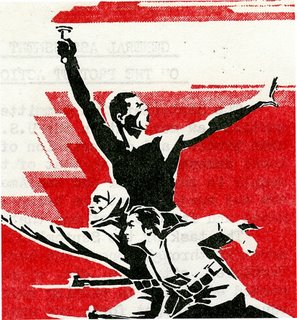AMADO V. HERNANDEZ

Introducing AMADO V. HERNANDEZ
By general consensus, Amado V. Hernandez (1903-1970) is the most serviceable Filipino revolutionary artist of the twentieth-century whose poetry, fiction, and plays in Filipino (the national language of 80 million Filipinos) continue to inspire the popular struggle for national democracy and genuine independence against U.S. imperialism.
Born in Tondo, Manila, on September 13, 1903, Hernandez began his career in journalism in the twenties when the initial massive Filipino resistance against U.S. military rule had declined. He became editor of the Manila daily Mabuhay from 1932 to 1934. In 1939 he won the Philippine Commonwealth Award for a nationalist historical epic, Pilipinas; in 1940 his collection of mainly traditional poems, Kayumanggi, won a Commonwealth Award. During the Japanese occupation of the Philippines (1942-45), Hernandez served as an intelligence officer for the underground guerilla resistance, an experience reflected in his major novel of neocolonial dependency and revolt, Mga Ibong Mandaragit.
After the war, Hernandez assumed the role of public intellectual: he organized the Philippine Newspaper Guild in 1945; and he spoke out on national issues as an elected councilor of Manila in 1945-46 and 1948-51. It was during his presidency of the Congress of Labor Organizations (1947), the largest federation of militant trade unions in the country, that Hernandez graduated from the romantic reformism of his early years to become a national-democratic militant. Meanwhile, the establishment of a U.S. neocolony in the Republic of the Philippines in 1946 extended the Cold War in the repression of local nationalist, progressive movements. It intensified the feudal landlord exploitation of the peasantry and reinforced the impoverishment of workers and middle strata, leading to the Huk uprising in the late forties and early fifties. An allegorical representation of the sociopolitical crisis of the country from the thirties up to the fifties can be found in Hernandez’s realistic novel, Luha ng Buwaya, and the epic poem of class struggle, Bayang Malaya, for which he received the prestigious Balagtas Memorial Award.
Owing to his anti-imperialist work, Hernandez was arrested on January 26, 1951 and accused of complicity with the Communist-led uprising. During the time in which he was imprisoned in various military camps for five years and six months, Hernandez wrote most of the satiric, agitational poems in Isang Dipang Langit and the pedagogical drama, Muntinlupa. His singular achievement is what I would call the invention of the Filipino “concrete universal,” the dialectical representation of socially typical situations that project the contradictions of ordinary life in a neocolonial formation, with its peculiar idioms and idiosyncratic nuances. Stories like “Langaw Sa Isang Basong Gatas” (see San Juan 1974) and poems like “Mga Muog ng Uri,” “Bartolina,” “Ang Dalaw,” and “Kung Tuyo na ang Luha Mo” exemplify this dialectical poetics in the service of what Mao calls in the Yenan Forum the twin tasks of partisan art: the uplifting of standards and the popularization of revolutionary ideas.
From 1956 to 1960, Hernandez wrote countless stories under various pseudonyms for the leading weekly, Liwayway; he also wrote columns for the daily Taliba, and edited the radical newspapers Ang Makabayan (1956-58) and Ang Masa (1967-70). But it was his participation in the Afro-Asian Writers’ Emergency Conference in Beijing, China, in June-July 1966, followed by his active intervention in the International War Crimes Tribunal (organized by Bertrand Russell, Jean Paul Sartre, and others) in November 1966, that demonstrated Hernandez’s renewed commitment to the advance of the internationalist struggle against global capitalism. His numerous honors culminated in the Republic Cultural Heritage Award (1962) and National Artist Award given posthumously in 1973, a recognition of his life-long service to the cause of liberatory poetics and social justice. Up to the day (March 24, 1970) he died, Hernandez was involved as a leading protagonist in mass rallies against imperialism, feudalism, and bureaucrat-capitalism, for democratic socialism and national independence.
Selected Bibliography
Hernandez, Amado V. Bayang Malaya. Introduction by Teodoro Agoncillo. Quezon City: Ateneo de Manila University Press, 1969.
----. Isang Dipang Langit. Manila: International Graphic Service, 1961.
----. Luha ng Buwaya. Quezon City: Ateneo de Manila University Press, 1963.
----. Mga Ibong Mandaragit. Manila: International Graphic Service, 1969.
----. Panata sa Kalayaan ni Ka Amado. Ed. Andres Cristobal Cruz. Manila, Philippines: Atang de la Rama Hernandez, 1970.
----. Rice Grains. Translated by E. San Juan, Jr. New York: International Publishers, 1966.
Malay, Rosario S. “Mga Ibong Mandaragit and the Second Propaganda Movement.” General Education Journal 17 (1969-70): 107-117.
San Juan, E. “Social Consciousness and Revolt in Modern Philippine Poetry.” Books Abroad (Autumn 1965): 394-399.
----. Ang Sining ng Tula. Quezon City: Alemar-Phoenix Publishing House, 1975.
----. Introduction to Modern Pilipino Literature. New York: Twayne Publishers, Inc, 1974.
----. Only By Struggle: Reflections on Philippine Culture, Politics and Society. Quezon City: Giraffe Books, 2002.
-----. Toward A People’s Literature. Quezon City: University of the Philippines Press, 1984.
Yu, Rose, Torres, ed. Amado V. Hernandez: Tudla at Tudling [Anthology of Published Poems 1921-1970]. Quezon City: University of the Philippines Press, 1986.
________________________________



Comments